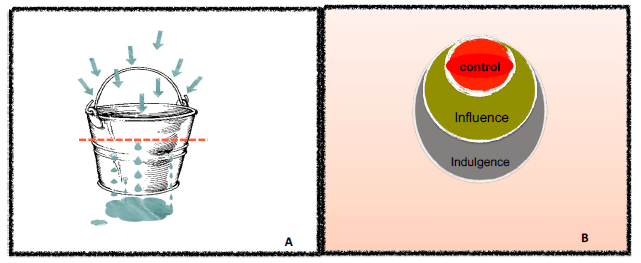
Ā mātou mihi maioha ki a Dr. Alia Bojilova for this timely and practical session on how we can grow resilience.
If you missed this session or would like to catch up, we are delighted to be able to add her wisdom to our VIDEO RESOURCES.
You can watch a short video of Dr. Alia explaining the gap between the thought and the thinker - or trigger and reaction - and how to interrupt patterns HERE.
We want to thank Jacqui Anderson for this thoughtful summary of this Juno Learning Online CPD session.
Building resilience: filling your bucket wisely
"The space between the thought and the thinker is precisely where all of us have to play these days, a whole heap more than perhaps we have ever been prepared for.
It invites us to create a gap—a deliberate gap between event and reaction—and, in that reaction, to choose precisely how we wish to present ourselves to ourselves."
- Dr Alia Boljilova
What’s in your bucket?
Resilience, often compared to a bucket, is filled by nourishing thoughts and experiences but is also drained by negative elements. Imagine your resilience as this bucket - what are you filling it with?

Nurturing resilience is beneficial and essential in the journey of life and career.
To build resilience, we must be conscious of what is going into our bucket, and make sure it includes things that help us thrive. These could include the support of loved ones, cherished experiences, grounding rituals, and empowering habits.
There will no doubt be factors that drain our resilience - workplace or personal conflicts, family pressures, health issues, or broader global concerns. These can leave us feeling depleted.
The key is maintaining a positive balance between what fuels and drains us. By being intentional about what goes into our bucket, we can aim to minimise what depletes us and focus on what energises and empowers us.
Creating space
We all have things that trigger us, sapping our spirit and depleting our resilience. These might be recurring negative thoughts, a stressful situation, or our response to a certain person. We can work to adapt our response to a trigger event. By tuning in to the situation and our thoughts, feelings and responses, we can then work to create space – to create a gap between the event and our reaction, and enable the potential for a different outcome. Key to unlocking this potential is curiosity.
In fact, Dr Bojilova reports that curiosity saved her life. While serving as a UN Military Observer in Syria, Bojilova and colleagues were taken hostage by armed militia. The situation was dire, but the hostages convinced their captors to release them. Dr Bojilova credits their release to curiosity, which helped them to find strength in adversity.
Embracing your inner hero
"Uninterrupted, 80% of our thoughts are negative. 70 to 80% of them repeated daily."
We are naturally biased towards negativity, but it is important to give ourselves credit for what we bring to the world. Take time to recognise your strengths, uniqueness, and the positive impact you bring to the world. Starting from this place of strength will help to build resilience.
Nurturing resilience is beneficial and essential in the journey of life and career. Resilience buckets that are filled thoughtfully and empower us to face challenges with strength and optimism.
"Resilience is like gardening. You cannot just pick up the seeds, plant them in a garden, and that very day expect there to be a fruit. Resilience takes time, a lot of time, a lot of careful attention and deliberate action to sustain and support. The sorts of things that we plant, whether we like them or not, will grow. So we have to be really thoughtful about sorts of thoughts and ideas we entertain for ourselves, and precisely where attention goes over time." - Dr Alia Bojilova